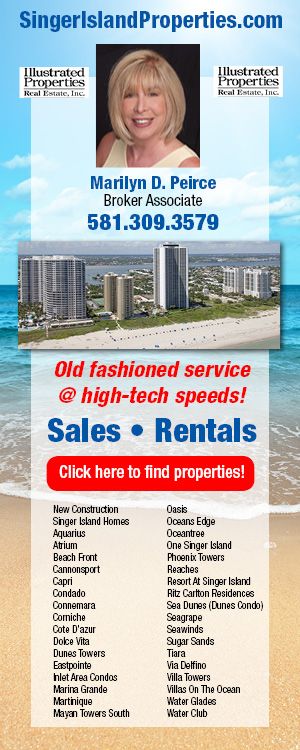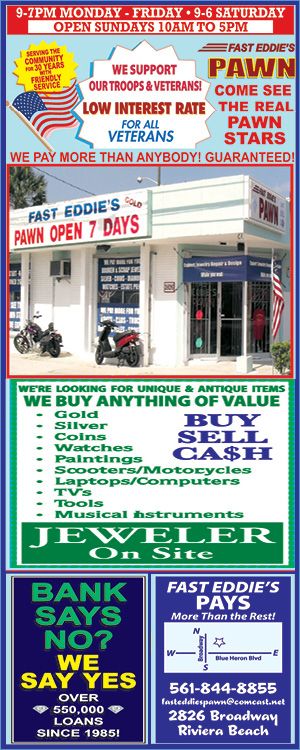Breaking News
- GANGSTER JOEY MERLINO WALKS ON EVERY CHARGE After a hung Jury, Boca Raton resident and alleged Boss of the Philly Crime family is the new Teflon Don.
After 30 hours of deliberations the Jury in the Joey Merlino trial told the judge they are deadlocked. So a mistrial was declared and Joey "Skinny Joey" Merlino is a free man. JR Rubeo, the governm...
more
- WALMART BONUSES I can't find 1 person who's gotten any Bonus at Lake Park Walmart
Ever since I read the much touted news that Walmart is giving all 600,000 of it's employees a $1,000 Bonus I started asking them if they had gotten it. For the last 3 weeks I've asked 27 different ...
more
Social Shots

Current Issue
Real Real Estate Article One
A "Real" Real Estate Education
by John Q. Podesta,
Broker Associate of United Real Estate
561-379-5875
CLIMATE CHANGE FOR YOU? Move to the Palm Beaches!
The 2016 “season” is off to an early start with many folks here from parts north returning – or escaping winter in the Palm Beaches for the first time. While many locals find it more difficult to get around town or get a reservation they might want, I say welcome to paradise and our tropical change of weather. Let the politicians and the scientists battle out the question of climate change. Here there is no question that change is good as evidenced by the warmth of the Palm Beaches. Do you really want to go back up north? From a real estate perspective opportunities are waiting for buyers, and as an experienced Realtor (over 26 years in this area) I have some professional advice to assure you can continue to enjoy our good life.
As with climate, real estate has its cycles. People tend to look at and for properties in the early days and weeks of their vacation time, and tend to make decisions and offers in the later weeks of their stay. We are now at the beginning of the season, and the fact is that inventory of properties is down. A good Realtor will know where to find them! Predictably desirable properties priced to the market will move quickly in the early months of this year’s season, so my recommendation is to go against the tide and not hold off making that purchase decision. There was many a disappointed prospective purchaser who did return to the cold north at the end of last season, when the condo or home they contemplated about for too long, was sold. A buyer has more opportunity for choice and decision making now than later. That is a fact! And a seller should recognize that this is the time to be on the market. Buyers do not tend to buy the only house on the block that is for sale – preferring more choices (“This one is perfect, but what else do you have”?). I have buyers who say that all the time, and to satisfy that thinking I need your listing to add to the list of choices.
A fairly new development in our local real estate business is that construction cranes are dotting our skyline with new high rises, giving more choices to a prospect. It is no secret that most new condominiums are in the upper price brackets (million dollar views?). A few comments: If you are considering exploring this market, I would suggest you need a good Realtor at your side. Walking into a sales office alone you are wooed by real estate sales people to get your signature on a pre-construction contract. Take your Realtor to be registered with you the first time you go into the sales office, and you will have trained eyes and ears with you to evaluate the salesperson’s presentation. Remember the salesperson is working for the developer, and your Realtor will be working for you – and at no cost (commission to your selling agent is paid by the developer). And if all works out and a contract is to be signed, it is probably time for your attorney to review the paper work. Those developer contracts have lots of fine print and should be negotiated with professional help.
So welcome Northerners! Your climate change homestead awaits. Let me know if I can help.
TODAY'S MARKET – NOT STATISTICS
Contrary to most news accounts of property values and sales for homes and condominiums in our area, today's real estate market has slowed considerably in comparison to earlier this year. Early 2015 was a strong market and prices have in fact gone up as a result. But remember that most of the statistics that are reported are a compilation of listings and sales from a prior period of time (like the last quarter). My perspective, in real time, is that today the momentum of quick sales and opportunities for buyer selection has softened. Remembering the basic rule that the market is governed by supply and demand, today I see both are down.
Buyer's will pay a higher price for homes when there is ample opportunity to choose between a selection of possibilities. When inventory of homes and condos for sale diminishes, buyers tend to hold off on decision making. That is a repeating cycle, and the statistics reporting on our "active market" with properties experiencing quick market time are, as I see it, a cycle behind.
So what does today's market really look like from my experience and other Realtors I have asked? Well it is pretty good for million dollar plus buyers with literally a growing selection of homes and condos from which to choose. New condo towers and new home developments abound. I trust developers would not be developing if there weren't an active market for the product.
The "average" priced home or condo resale market is not having the same boom today. As I see it more and more buyers who bought homes as vacation properties to escape the Northeast, are now entering full time retirement and keeping those properties as their homestead. Just look at the increase in local traffic we all saw this past summer – with far more cars on the road than in past off season months – meaning more year round owners. Homes and condos are not "flipping" as the escape for many is not the weather of the Northeast, but the taxes and cost of living. So what does that mean to you? As a buyer take another look as I know of many good resale properties that are worth snapping up. For sellers price it right, and if you are even just thinking of selling call your Realtor. In this market you need a professional to bring you a buyer. Can I help?
HOLIDAY SHOPPING FOR REAL ESTATE
The "tradition" in real estate, is that the holiday season is the slowest time of the year for the sale of homes and condominiums. The holidays in real estate start just before Halloween and run to after Christmas. While buying and shopping for just about everything else moves into high gear, serious consideration to shop for real estate properties to sell or purchase most commonly falls to the end of the average "to do" list. Stores put on extra staff, open longer hours, and consumers stand in lines to make the best purchase at the best price. While I am not an economist it seems to me that the best time for a good deal is when inventory is up and prices favor the buyer; and that is not the situation when everyone is flocking to buy and demand is high – and so are prices.
Meanwhile, in the real estate shopping mart, inventory awaits deals to be made. The slowest time of the year for shopping for real estate is predictably the best time to negotiate for your new home. A serious seller must have strong patience as showings of their listed property fall in this off period. But, on the other hand, a smart buyer is in a favorable negotiating position as demand is down, and what better time to make a deal with a seller on your new home?
Now I do not mean to be scrooge to distract you from for all the fun and festivities of the holiday seasons, and while there is no specific "Black Friday" in real estate, there is the opportunity to shop in a much less congested marketplace. There are advantages to both buyer and seller.
For the Buyer: While closing on a property and moving to or from a home in the weeks between Thanksgiving and New Year's Day might be more than one wants to consider, working with your Realtor to make an offer and sign a contract for a future closing date is really not much of a burden or distraction. In fact it might be a time for a celebration in that you found the house and got it; or you found your buyer and sold it.
For the Seller: Your house or condo will probably never look more welcoming to a "looker" than when the decorations of the season are hung. It is like the old adage of baking cookies before a showing to entice a buyer. The holidays are a great time to show off your home. Be sure your Realtor knows that showings are by advance appointment only so you can plan your holiday schedule. But reserving an hour or two here and there from the holiday routine for a little business can work to your advantage. It is a great time to benefit from the good will and spirit of the season in considering an offer and hopefully a sale. Likewise a closing and moving can be negotiated to a mutually convenient future date.
If you are in the market to find your Florida dream, why wait to join all the other home seekers in the 2014 winter season? I have predicted that 2014 will be a strong market place as current sale trends continue. Consider listing, looking, selling and buying when the market is at its slowest. Traditionally that is now. Check the internet, talk to a realtor, take a break from the mall and give yourself a break in shopping for your home – in fact buy it now to enjoy this season. I have the time to look if you do!
What to Watch Out For When It's: "FOR RENT"
With all the recent good news about the recovery of the real estate market (inventory of homes and condos for sale in many communities are at recent all time lows), one has to remember that one of the problems that burst the bubble last time was investors speculating on buying properties low, and counting on rental income to sustain their investment until a profitable resale sometime in the future. Actually it was that kind of marketing and thinking that caused many an investor to loose out, because in that formula the missing "x" factor was "rent to whom"? The moral is if you are going to purchase with the intent of becoming a landlord to cover taxes, insurance, maintenance, etc., be sure there is a ready market of renters from whom to choose. Do you or your Realtor have a qualified prospect to move in as a tenant soon after you close on your investment? If not that is certainly one of the things to watch out for!
Do you know that a Realtor cannot "write" a lease in the State of Florida? The Supreme Court in this state requires that a state approved form be used and/or that an attorney draw a lease. In accordance with that ruling, most Realtors will have the owner and tenant fill out the blanks on the state form. The terms can only be amended by mutual agreement of owner and prospective tenant (not Realtor). Remember that a lease is a legal and binding contract, and leasing a property has risks for both parties. Be sure any lease you enter into addresses the many "what-ifs" to protect your interest. What if the rent is late? What if the landlord does not do repairs? What if the tenant doesn't surrender the property at the end of the lease? What if the tenant violates condominium rules? What if the owner goes into foreclosure and the bank moves to repossess the home before the end of the lease? What if the owner sells the property during the term of the lease? In many ways a lease is more complicated an agreement than a contract for sale. If in doubt seek the advise of an attorney when you are on either side of the transaction.
Although a Realtor cannot technically write a lease, a Realtor may be your best resource in matching a tenant to an owner looking to rent. A listing with a Realtor to rent a property goes onto the MLS just as a home for sale would. The Realtor will show the property, can help getting the tenant qualified, collecting references, getting condominium approval, holding initial deposits in escrow, etc. Although a Realtor cannot discriminate in offering or showing property to rent, the final decision to accept a tenant is the owner's. And once the lease establishes the relationship of landlord and tenant – the tenant is the owner's tenant – not the Realtor's tenant; and, as often happens, the tenant should not assume that the Realtor is there to fix or solve every complaint and problem. The Realtor may be the first point of contact, but, unless hired by the owner to be a manager, the Realtor can only be the intermediary of messages between the parties.
Being a good tenant means respecting the property and treating it as their own. A good landlord is responsive to the tenant's needs for peaceful enjoyment of the leased property. A good tenant (by experience or references) has value in negotiating terms with an owner for a lease extension or renewal. Respecting each other's positions makes for the best relationship. Just make sure all is covered in writing to avoid disagreements and disputes.
THE SEASON TO BUY REAL ESTATE – IS NOW!
The locals in the Palm Beaches know that the months of September and October are among the slowest in the market place for business. We also know that everyone is looking to the real estate market to rebound, and wondering about the so called "bottom of the market." Well, maybe some haven't been keeping up with the news of late. Here are a few headlines – most of them lead stories, from the Palm Beach Post: June 27th "Home Prices on 5-Month Climb;" July 20th "Home Sale Prices Take Off;" August 23rd "Home Sales, Prices Jump in County;" and September 20th "Shrinking Inventory Drives Up Home Sales."
I have been writing this column for some time now with the purpose of sharing professional advice to our readers, and have carefully and deliberately refrained from self promotion of my real estate listings, leaving that message to the back page of the paper, my place in the news to promote properties for sale. But I also realize that I would be doing a disservice to my readership if I didn't give the best professional advice I can offer at this time. And that is, that for a buyer, there are properties now listed by my company and likewise other local real estate companies that are opportunities (as they say) too good to pass up. Excellent properties on the market at or below current market value, in a market, according to the headlines, that is more than bottomed out: Another headline: July 24th "S. Florida Home Values on Rebound, Spike 6.4%." So breaking with tradition here are two real estate opportunities you might want to consider this season.
In the gated community of Old Port Cove, in a direct intracoastal premier tower -- where comparable three bedroom condominiums (2,478 sq.ft living area / 2,950 total area) are on the market averaging $500,000., there is a corner condo on the 16th floor for $405,000. -- and at that price, fully furnished. Both bathrooms have been redone and modernized. The views are stunning to the horizon across the ocean. It is an opportunity looking for a smart buyer to save almost $100,000. in this slow season for lookers.
Another won't meet everyone's criteria, for it is a one bedroom one and a half bath condo, also in Old Port Cove with a balcony off the master bedroom and living room looking past the million dollar yachts in the marina across to waterfront estate homes and state parkland. Marble and porcelain floors and other upgrades make the condo unique, but the best feature is the price reduced to a buyer's advantage of $185,000. And the tower has all the luxury amenities you would expect from condominiums triple the price. And did I mention 24 hour gatehouse and covered parking?
I cite these two examples to demonstrate that in my professional opinion, and as reflected in the headlines of the local media, the market is on the way up – with inventory depleting on properties still priced at what some might call "a bargain." If you are going to get into the real estate market, my advice: Do it now!
Is Seeing Believing? Check it out "Night and Day"
If you think you've found the perfect property to move into after one or two showings by your REALTOR, it might be worth your taking a little closer look—and doing a little more investigating before closing the deal. Things aren't always what they seem to be on first look.
Although the house or condominium you have found may meet your objective requirements of price, size, bedrooms, view, amenities (pool, and all the rest on your list), are you sure about the more subjective aspects of the property? Have you asked for and received a "Seller's Disclosure"?
Although there is no required statewide form, the Realtors Association for the State of Florida (Florida Realtors) does have a "Seller Disclosure" form on line for Realtors to give to owners. Some offices have their own developed by their attorney in an effort to limit corporate or agent liability for undisclosed defects.
The disclosure form is a series of questions that an owner is asked to complete without the assistance of anyone else. And that includes that there is to be no help or advice from the listing Realtor, who is often asked by a Seller as to how to answer this question or that question, or put a potential problem in the best light. A Seller's Disclosure is intended to be just that: the "disclosure" by the owner about his or her personal knowledge of the history of the home, and environmental issues of the home and neighborhood.
Questions go beyond the condition of the house and include environmental issues. For example: Odors, (Is the dump within range?); Commercial or municipal lighting (Does the nearby parking lot or sports complex lighting shine into the home at night?). These types of property disclosures are not included in routine professional reports, reporting on condition of the structure and grounds -- not the neighborhood or setting.
Remember that a Seller's Disclosure is the "opinion" of the owner and is not a substitute for an objective report from a professional inspection company that you hire. And also note that YOUR personal observations are just as important. You might want to re-visit the property at various times of the day and night to check on environmental issues. You might find the school bus stops at the front door with a line of kids on your lawn; that street lighting is inadequate; that the convenience of the nearby shopping center also puts off cooking odors from the BBQ place or the noise of delivery trucks early morning or night.
And a most important reminder is the benefit of including a Realtor in the transaction. That gives you another set of eyes for comments and observations, and questions to ask. Put all the expertise, information and observations available to you together as you do your do diligence about the home you are considering, and you'll make the best decision for enjoying your home night and day.
KEEPING FOCUSED ON THE TRANSACTION Are you Buying/Selling the House or the Couch?
Sellers often ask if they should list the property furnished or unfurnished. There are a number of considerations to take into account to answer that query, and just as many considerations from the Buyer's point of view. I am often asked: "Are the furnishings included in the price?" Let's take a look at that question from both the Buyer's and the Seller's point of view.
The objective for listing a home for sale is to sell the home. Now that might seem to be an overly obvious or simplistic statement. But if a seller is not careful, what is being "sold" in addition to the house can often stand in the way of bringing a sale to closing.
There are three (at least) options for a seller when pricing the house for sale. If it is not the intent of the seller to keep and to go through the expense of packing and moving the existing furnishings, one could put a "furnished price" on the property, so a potential Buyer is asked to make an offer on a package. But what if the Buyer likes the house but not the furniture? One could expect the buyer to make an offer subtracting the perceived value of the furnishings from the contract price. This often leads to a negotiation between the parties of the price of the couch instead of staying focused on negotiating the price of the house, and often times the "value" of the furniture turns into an argument which stands in the way of what might otherwise be an acceptable offer for the house.
The next option is to price the house at a furnished price and also at an unfurnished price, giving the Buyer a specific asking price for each. A better option in my opinion, but the value of the furniture will still inevitably become part of the negotiation, and can lower the offering price of the Buyer.
From this professional's point of view, consider listing the home at an unfurnished price. If it is the Seller's intent to also sell the furnishings, hold off any negotiation of the furnishings until there is agreement on the price of the house (remember selling the house is the objective). After the contract is signed on the house, the Buyer and Seller can negotiate the price of the inventory. That means that the Buyer will potentially be paying an additional price for the furnishings over the price of the home. This can also save the Seller commission on the furnishings, and can also have tax implications to the advantage of the Buyer (check with a tax attorney or an accountant on this).
Another tip is to not make the transaction more complicated by offering the house at a price with a number of exclusions that a Buyer would normally expect to be included. "Oh, the washer an dryer are not included, and we are taking the microwave." A better strategy might be to factor those types of exclusions into the asking price, and to buy new ones for your new home. Keep focused on the objective of buying or selling the home, without the distractions of trying to factor in the price of "used" furniture or exclusions.
STAGING YOUR HOUSE IS NOT A BIG PRODUCTION
Once you have listed your house for sale (hopefully with a local, experienced REALTOR), the next few weeks – possibly months, will require you to make some changes in your daily living routines. Although a good Realtor will help with scheduling a showing of your property in advance, it often happens that someone will have to see it on short notice. Of course you can always say "No" to a request, but one never knows if the one you put off is/was the perfect buyer. When your home is on the market it is similar to it being in a store window. There will be a lot of window shoppers (lookers), and, as with shopping for anything, "window dressing" can make or break a potential sale to the right person.
In the business of real estate we call getting a home ready to show "staging." Many "experts" (e.g. decorators) may offer you their services with a sizeable bill attached. Some stores (e.g. consignment shops), may offer to place their merchandise in your home in place of yours – or to "furnish" an unfurnished property for that lived in feeling. Again you will want to check the charges for such services, and your responsibility/liability for loss or damage. A cost benefit analysis would be wise before making a commitment. Would you like my advice? Then here it is at: and at no charge! Use a Realtor who knows how to stage a property for sale. Better yet, to your advantage, you can do it yourself. Here are a few of my tips on staging your home for sale.
The first is to "de-personalize" your home by removing (limiting) the collection of personal & family pictures and photographs on display. They not only remind the prospect that this is "your" house instead of thinking it could be "their" house, lookers are often distracted by the pictures and will ask more questions about them then about the house ("Oh – are these the owner's grandchildren?", etc.). Remember a prospect needs to stay focused on looking at the house -- not your family history. Next make sure that traffic patterns are free and clear by adjusting furnishing. Make open spaces look larger – remove that extra card table, or folding chair or bulky ottoman.
Clear off anything you do not use regularly from the kitchen and bathroom counters. The bread-maker, the juicer, the blender will all store below and the counter (and kitchen) will appear larger and uncluttered. Don't forget all those magnets on the refrigerator door. In the bathrooms makeup, toothpaste, and the like can find a place in a cabinet or drawer. In summary, all counters as naked as possible.
Be sure that all entrances and exits are accessible. For example do not put an obstacle in front of the sliding door to the yard or balcony; if there are verticals or draperies be sure they are open, or that the Realtor has easy access to the controls. Pull strings and chains in a tight corner behind a table and lamp make for a difficult presentation in showing off the features of your home.
Here is a tip I have used successfully with many sellers. Step out your front door, count to ten and then go back in as if you were a potential buyer. Look around critically at things that would distract you from wanting to consider this home to be your new home. It is amazing how much you will notice and be able to correct. Staging your home for sale is really not a big production, but if done right your grand finale will be the sale you are waiting for!
THE MARKET SETS THE MARK FOR BUYER & SELLER
A house or condominium's value is most commonly determined upon that which a willing buyer and a willing seller are willing to agree. There are many indicators that either party can use to try to determine what a property is worth. This first one that probably comes to mind is to have an appraisal done. I would agree it is one of the best starting points, but with the condition that the appraiser chosen be properly licensed by the State, experienced, and also that the appraiser be a "local" appraiser who is familiar with the neighborhood and the value that can be put on the property's specific location and attributes. A similar sized home with similar amenities (e.g. a pool, a fireplace, the number of bedrooms, a two car garage, etc.) but located just outside a particular neighborhood can easily be worth more or less than the subject property. Many clients are having disappointing results with appraisals being down by lenders who will frequently employ appraisers from towns or even counties away. I have had personal experience where an appraiser chose to compare a zero lot line home (within a home owners association) to a private house, and in the same appraisal would not consider a recent sale of the house directly next door. Lenders seldom accept appeals to their appraiser's value. Alternatively to arrive at an asking or offering price there are a few easy questions your realtor should be able to document for you with printouts from the regional multiple listing service.
Your realtor is able to look up and give you a profile of the neighborhood in terms of recent sales, listed sales, and pending sales. This is called a CMA (comparative market analysis). Its information will be a good indicator of the neighborhood's market value of similar homes. You do need to do some analysis in comparing the similarities of the properties being compared (like this one had a pool but this one did not). Those differences can be discerned through relatively easy data searches or from the MLS printouts. www.realtor.com is a great resource for listed properties, and locally, www.pbcgov.com/papa/ (the Palm Beach County Property Appraiser) provides tax information as well as past sale price information. Remember that sales in the past 6 months would be most reflective of "current" market value, and not what they got last year for a similar property. Real Estate trends are local and current sale information sets the local market value.
But back to the top with the value being set by the "agreement" of a value (price) by a willing buyer and a willing seller. Hard facts and numbers are not the only criterion in setting value for a specific property. There is personal motivation and circumstance that play an equally high role in determining the selling price. Health problems, financial problems, one who has to sell or has to buy now for whatever reason, or as simple as "I love it and I have to have it," all factor into the negotiations as much as the value of the last sale.
The mistake on either side is to take an unreasonable approach to determine value. In this market (which has stabilized in this area) you should not expect to "steal it" nor should a seller simply be hardnosed and say "Don't bother me with facts – that's what I want." If I were to try to sell you a stock above its value on the ticker you certainly would not pay it. You will, if all other motivating factors are in place, pay market value.
That is what I call a fair negotiation for both parties. A property should be expected (like the stock) to be listed and sold for its market value at the time of sale. Case closed!
FINANCING A PURCHASE – QUESTION AND ANSWERS
Talk to anyone who has been trying to buy or sell a house lately, and the number one problem you will hear is that it seems that conventional mortgage lenders (primarily banks) can find a reason to say "NO," even with good credit and a good appraisal of the value of the property. Any REALTOR will tell you that otherwise solid contracts are not closing, sometimes at the last minute, when the bank finds some reason to decline financing. So with the aim of helping you understand what you can do if you find yourself in this situation, I sat down with the President of Barnett Financial Services, Mr. Dana Barnett, Certified Mortgage Consultant. Dana is a Licensed Mortgage Broker and State Licensed Originator with a 30 year track record of success in his own mortgage business and whose expertise I have always found helpful. Here is a part of our discussion:
Q. Dana, let's start with what is the difference between a Mortgage Broker and a Lender?
A. Now that the market for loans has been consolidated, there are two major camps: a) The one size fits all "Mega Banks" e.g. Bank of America, Wells Fargo, Countrywide and; b) The ‘small' independent Mortgage Banker or Broker who has access to many national lending firms and ‘matches' the loan with the right lending source.
Q. What can a prospective borrower expect today when they apply for a loan?
A. A much more cautious environment than prior to 2008!! That means increased documentation, and the requirement that every aspect of the loan fall within very strict tolerances!
Q. So if it has become difficult to get a bank to write the mortgage, what are the alternatives?
A. If a conventional or traditional bank loan is unworkable there are alternatives! In these situations, a more common sense approach to the loan can be used such as making up for low income with additional cash reserves; or overcoming a credit issue through a detailed explanation and documenting it correctly. We call this ‘common sense' underwriting. The rates and/or down payments may be a little higher, but with all rates at historic lows a borrower can buy a home way under market, and have it all still make sense. The bargains out there are worth it!
Q. Are there different criteria for financing a condominium vs. a private residence (house)?
A. Yes! I'm glad you asked...The major difference is to make sure that the association is "professionally" operated; all proper insurance coverage is in place; there are not a majority of renters, foreclosures or outstanding lawsuits. Otherwise you will need an ‘unconventional' or portfolio loan.
Q. So what is a Portfolio Loan?
A. Great Question! A portfolio loan is where the lender keeps the loan ‘in house.' The advantage is that the lender is free to make it's own judgment calls in regards to the loan and can be more flexible regarding the approval.
Q. What is involved in getting pre qualified or pre approved? What constitutes loan approval?
A. Pre-qualified is a ‘discussion' that gets you into the ‘ballpark' for a loan. Pre-Approved means your credit check and other steps are complete such that the loan is contingent only on the property appraisal, and/or condominium approval—then you can close!
Q. What is the right way to shop for a loan?
A. I recommend a prospective borrower contact a Bank, and a Mortgage Broker and maybe one other source such as a Credit Union and select their lender way in advance of making an offer on a home. That way, a reliable price point can be established and any obstacles cleared before they become a problem.
I want to thank Dana Barnett for sharing his thoughts with us, and more information is available on his website, www.barnettfinancial.net. He can be reached 24/7 at 561-686-3333.
KNOW WHAT YOU ARE SELLING - KNOW WHAT YOU ARE BUYING
The buying and selling of real estate is no simple transaction for either buyer or seller. Recently the Orlando Association of Realtors cataloged the tasks involved and counted 183 steps from listing to contract closing and follow up. A good REALTOR can seem to make it all come together rather effortlessly to you – but be assured there is a great deal of almost daily attention and work being done to bring the sale to a successful conclusion -- one step at a time.
One of these steps is the inspection of the property. It would not be unusual for a sales contract to set a time frame for the buyer to conduct an inspection, and also to spell out the terms and conditions of the inspection (Will the power be on? What if something is damaged during inspection? What will the owner's obligations be (if any) for deficient items? Etc.). The inspection is routinely done after the contract is signed (in accord with the terms and conditions spelled out), and the result of the inspection is a contract contingency, i.e. the results could be the basis for terminating the sale – a result about which neither party is usually happy. So here is some advice for Buyer and Seller concerning property inspections:
SELLER: Instead of waiting for an offer and a contract and for the Buyer to do his or her inspection – a seller (owner) should take the step of having an inspection done when the property is first listed. A novel idea perhaps, but knowing the condition of what you are selling up front will dramatically ease the surprise of finding out after you have negotiated a contract. And there are other reasons for your investing in an inspection up front. There may be some items that would obviously be troublesome to a buyer, but which you might be able to reasonably correct or repair or replace to eliminate the problem. And if a good inspection report is available to your REALTOR as the property is being shown – you give the potential buyer a level of confidence to make an offer. Work with your REALTOR to have a professional home inspection done when you first list the property, and keep receipts as evidence of any corrections you made as a result.
BUYER: Even if the Seller has provided you with a copy of an inspection report, you certainly will want to conduct your own to verify the condition of the property. When hiring an inspection company the choice is always yours. Your REALTOR may be helpful in citing a number of company names for you to consider, but check references and make the selection of your own choosing. You might need several inspectors i.e. one who specializes in mold, or termite, or roofing, etc. Some companies provide a package of services and coordinate all into a comprehensive report. Most importantly be sure to work with you REALTOR to strictly comply with any time frames in the contract for the completion of inspections and/or your options for actions thereafter. In contracts "time is of the essence." Be sure you don't miss out on this important step in buying your new home.
THE "FOUR SEASONS" OF REAL ESTATE
With the onset of summer most homeowners and prospective buyers perceive the end of the real estate season in south Florida. With less congestion on our roads and intersections, with a table at our favorite restaurant so much easier to come upon, and with snowbirds in flight many assume that our local real estate market likewise comes to a halt. But with years of experience and trending data backing me up – you might be surprised to know that real estate sales do not burn up in the summer months.
Let me clarify. Realtors are much busier in the primary "season" in our area with snowbirds and their families and guests here to vacation in the sun and – while they are here, take some time to look at real estate. Showings do rise rather dramatically, but many are just "vacationing lookers" (my office is always busier on cool or rainy days or other non-beach days). Lookers may become buyers – but the ratio of lookers to actual contracts does not have an equivalent surge. In most years actual offers and sales are fairly consistent throughout the four seasons – we are just busier with more activity in the high seasonal months of December through April. If you ask what the best time to have your property available to get more showings it would be the winter season – but on the other hand in our "summer-season," many buyers are apt to be more serious lookers in hopes that the owner will be accepting of a low off-season offer. Most sellers are not. The sale price should be expected to be the market value at that point in time. Prices and values do not take a sudden dip May 1. In off season you may be more likely to get an offer to negotiate – perhaps starting lower than you might like, but hopefully the beginning of a negotiation to market value.
Looking more carefully at the summer season here – consider all the people who cannot have the luxury to be away three or four winter months, such as school and university teachers, and families with children in school. I mark the start of our summer season to correspond to the day schools close up north and families are free to vacation here. The fall season begins when schools reopen and folks are back north getting ready for the approaching holidays (Halloween, etc.). I will agree these are really our slowest in real estate: the fall season of late September to Christmas, and the spring season of May to mid June.
But lookers are always here. Trying to figure that there is a dramatic advantage to making an offer or putting your place up for sale in a certain month or season may be a waste of calculating time. Look for it when you are here. Price it to the market when you list. Deals are made in all four seasons. And a personal note of advice: always use an experienced and "seasoned" realtor.
RESPECTNG THE "RULES" OF THE NEIGHBORHOOD
Under state law if you buy a condominium in Florida you have a three day rescission period (opportunity to cancel a signed contract) after you have received a set of documents from the buyer – which will include a copy of the "Rules and Regulations." In those instances where a prospective buyer needs approval of a home owner's association, and/or a condominium association to close the deal, there is always one question that is asked of the Buyer: " Did you receive a copy of the Rules and Regulations, and do you agree to comply with them"? To some that question may seem like a "condo-commando" interrogation, but if it were not for a reasonable set of rules the value of your investment could be in jeopardy. There are exceptions of course, but a set of rules, respected by those in the building or neighborhood, can add value to property and its resale value. If the rules seem to you to over reach or encroach on your ability to peaceful enjoyment in your new residence – then it may be wise to reconsider your choice. In most instances, however, the Rules and Regulations are well intended to help neighbor live with neighbor, and maintain the appeal and appearance (and thus value) of the community.
Some neighborhoods simply have deed restrictions, which will cover such things as overnight street parking, requiring garage door to be closed, or limitations on the parking of commercially marked vehicles or oversized vehicles (campers, boats, etc.) in a driveway. If such restrictions seem as intrusions on one's right to do with their property as one pleases, another buying choice might better serve your lifestyle.
The point is that when considering a purchase of your next residence or vacation home you should review and understand the rules, regulations, and restrictions that you may be required to observe. Being a good neighbor -- and your enjoyment of the community -- will undoubtedly depend on everyone's respectfulness of those rules or restrictions.
And here are a few notes and tips from an experienced Realtor. Rules and Regulations are always subject to change by vote of the owners. What has been a privilege for owners for many years may necessitate a change after years to the contrary. For example an association may decide to limit rentals in their building to assure that mortgage money will be more readily available for re-sales. Be sure you do not rely on the past history of a community and get and read a current copy of rules when considering a purchase. And if you find yourself having a neighbor in violation of a rule (like using your parking space), refer the complaint to the board or manager, thus avoiding a personal conflict. Let the system resolve your complaint, thus avoiding a personal feud with a neighbor.
Rules and Regulations can make good neighborhoods better, and good neighbors better neighbors. As a Realtor I can attest that a respect for them can potentially add value to your purchase and community. Just be sure you know what is expected of you before you sign on the dotted line.
Getting it Sold Starts With The Listing Agreement
In a real estate transaction most think that the only contract that counts is the "sales contract." But there are actually two contracts involved in most transactions and it starts with the terms of the contract between you and your real estate broker. It is most commonly referred to as the "Listing Agreement," but it is a contract just the same. First a disclaimer: only a lawyer can interpret the terms of a contract, and this columnist is not an attorney and is not here to give legal advice. Speaking as a Realtor I hope you find the following comments and suggestions helpful -- before putting pen to paper.
The listing contract is one with a definite term and it cannot be written to provide for automatic renewals. The first question most prospects ask of me (besides " at what price do you think we should list it"), is "for how long will our agreement be?". As with all contracts that is a point of negotiation. My suggestion is to give the broker you have chosen a sufficient amount of time to market and show the property. The broker's marketing plan will most likely include the investment of time and money (the broker's) in promotion and advertising, and shortening the time frame of the term may be a disincentive to the broker, as the listing may end just as the advertising has started to produce results; it takes many months to promote and find a buyer for a property in this market.
The standard listing contract, used by most brokers, is several pages long, and the "asking price" and "term of the agreement" (length) are but a few lines on page one. Other issues for you to negotiate are the commission (of course); will the agent accompany showings; will you permit a lock box on the property; what are the showing instructions; will you permit a sign on the property; what are the cancellation provisions and/or penalties; is there a "protection period" for you to still be obligated to the brokerage for a sale after expiration of the agreement; will the property be on the MLS or other websites; are you obligated to pay an "administrative service fee" in addition to commission, etc.? Take your time with the agreement and go over the terms carefully. These and other terms are all negotiable between you and the broker.
And, as usual in this column, here is some advice. Some terms that you might think are to your advantage might produce just the opposite result – like a short term which doesn't let the agent get started with the task at hand. Commission rates are always negotiable, and one should be confident that the rate negotiated works to your benefit while not being one that works as a disincentive to co-brokers to choose to show your property in competition with other properties on the market. Fair market value for pricing the property is one incentive to attract showings, but the others terms of the listing agreement may determine how long it will be before the listing contract results in a sales contract. I suggest you listen carefully to your broker's experienced advice on each of the terms of the listing contract and after discussion, negotiation and agreement the contract will lead to the mutual objective of both the parties (yours AND the broker's): to get the property sold. It all starts with your hiring your broker under the terms you have negotiated in the listing contract.
An Insider's Look at the Business of Real Estate
Have you ever wondered how the business of real estate really works? If you were deciding to put your home on the market who would you call – and why? What is the difference between a licensed broker and a licensed real estate associate? What are the advantages and disadvantages of listing with a large franchise real estate company with hundreds of agents or with a small boutique office with a small cadre of agents? In Florida does a broker represent the Buyer or the Seller in the transaction – or does or can the Broker "represent" both? How are agents compensated? Here is a candid peek into the business of real estate.
To be compensated for providing a service of real estate in Florida you must hold a valid and active state license. Active means working under the supervision of a Broker. No unlicensed person, except a party to the transaction, can receive any sort of payment or gift for the sale, purchase, exchange, leasing, or for property management of real property. All compensation must be handled by and through a licensed real estate Broker, who then can pay the company's licensed real estate associates a split of the commission. When you give a listing to an agent, the listing is really a contract between you and the company. The Company/Broker "owns" all listings, and if your "agent" left the company, the listing would remain behind with the company (in the normal course of events).
Florida is a "Transaction Broker" state, meaning that the Broker and all of his/her agents are by law required to provide limited representation to both buyer and seller, unless a specific written agreement is entered into to provide exclusive agency representation to one or the other. Simply put your agent must treat both the buyer and seller honestly and fairly and not disadvantage the buying or selling position of the other. The agent is working for the transaction (the deal) to be accomplished to the best advantage of both parties. And you thought our job was easy! (Note: this is not the same as "dual agency" which is not permitted in Florida.)
In practice the listing agent is the person you are relying on to bring you a buyer at price and terms acceptable to you. You list with that agent because you consider him/her the best qualified for your sale. Do not think that if a company has hundreds of agents, that they are all now working to sell your listing. Each individual agent is an independent contractor working and motivated to sell each of his/her own listings. And a company of hundreds of agents has hundreds of listings to market. A small boutique office will have far fewer agents and total listings, but you are not competing with hundreds of other properties. I have always favored smaller, non-franchise offices for more personal attention and service to both buyer and seller. And there is a greater tendency for the agents in a small office to work as a team to sell each other's listings for the good (profitability) of the office.
John Q. Podesta, Managing Broker Capital Realty Residential 561-379-5875



.jpg)
.jpg)
























